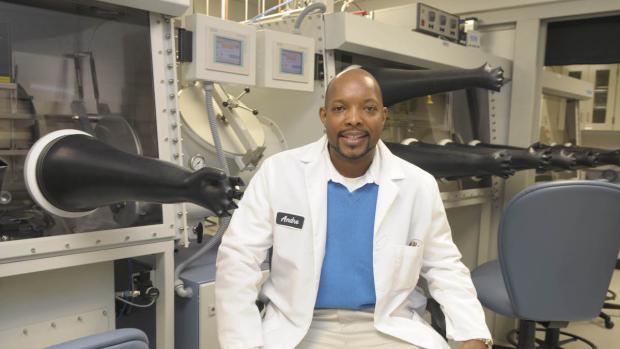Renewable-energy pioneer among most inspiring Black scientists in America
André Taylor, an innovator in photovoltaics, rechargeable batteries, and space-age materials, joins an elite list of top researchers, physicians, engineers and scholars.

BROOKLYN, New York, Wednesday, January 6, 2021 – André Taylor, associate professor of chemical and biomolecular engineering, has been honored by the Community of Scholars as one of 1,000 Inspiring Black scientists in America. The list is published by the Cell Press Cell Mentor, a professional site for scientists and researchers. Taylor, a leader in energy conversion and storage technologies, joins an elite list of researchers that includes NYU faculty members Andre Fenton, Aisha Langford, Azizi Seixas, and Girardin Jean-Louis.
For Taylor, who came to NYU Tandon following a tenured professorship at Yale, where he headed the Transformative Materials and Devices Group in the Chemical and Environmental Engineering Department, exploring the possibilities of renewable energy for the benefit of society is a longtime passion.
At NYU Tandon, Taylor leads an initiative focused on the development of industrial systems to make petrochemical manufacturing more sustainable by integrating electrochemical systems (e.g. fuel cells) and energy storage innovations, key research areas for his lab, with clean electrochemistry. An important part of this initiative are projects to cultivate diversity and inclusion within the chemical industry.
But he also has his eye on the sun: much of his work involves designing revolutionary photovoltaic systems and envisioning new ways to fabricate them at scale, using sustainable, longer lasting, and more durable materials. For example, over the past decade Taylor and researchers in his lab have pioneered a new family of organic solar cells — such as those using natural photoactive materials like perovskite — that could be cheaper to fabricate than silicon-based cells, more efficient to use, durable enough to withstand the ravages of weather, and flexible for applications in everything from electric vehicles to wearable electronics, or even backpacks that charge cell phones.
Most industries are benefiting from rapid advances in battery technology. Taylor’s work in this area includes innovations in low-cost rechargeable battery designs, including one using electrodes coated with easy-to-obtain asphalt. This research could, for example, make rechargeable sodium-ion batteries based on low-cost, abundant, easily processed, and non-toxic materials a reality — a cost-effective and greener alternative to high-cost lithium-ion batteries.
Taylor’s lab is also addressing the dangers that electromagnetic radiation poses to mobile devices, by developing a cost-effective process for making strong, flexible films that allow light in but keep electromagnetic interference (EMI) out. The novel approach, using a unique family of EMI-blocking materials called MXenes, led to a 38% enhancement of EMI-shielding efficiency over conventional methods. A paper on his lab’s work on MXenes, published in Advanced Functional Materials, was cited as one of the journal’s most downloaded for the year.
Taylor is a recipient of the Presidential Early Career Award, the highest honor bestowed by the U.S. government on outstanding young scientists and engineers.
Note: Images are available at nyutandon.photoshelter.com.
About the New York University Tandon School of Engineering
The NYU Tandon School of Engineering dates to 1854, the founding date for both the New York University School of Civil Engineering and Architecture and the Brooklyn Collegiate and Polytechnic Institute. A January 2014 merger created a comprehensive school of education and research in engineering and applied sciences as part of a global university, with close connections to engineering programs at NYU Abu Dhabi and NYU Shanghai. NYU Tandon is rooted in a vibrant tradition of entrepreneurship, intellectual curiosity, and innovative solutions to humanity’s most pressing global challenges. Research at Tandon focuses on vital intersections between communications/IT, cybersecurity, and data science/AI/robotics systems and tools and critical areas of society that they influence, including emerging media, health, sustainability, and urban living. We believe diversity is integral to excellence, and are creating a vibrant, inclusive, and equitable environment for all of our students, faculty and staff. For more information, visit engineering.nyu.edu.




